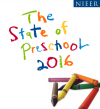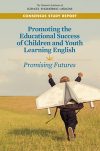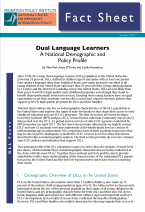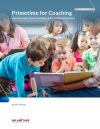The National Academies’ Transforming the Workforce report discusses the need for stronger pre-service and in-service opportunities for early educators. On the higher education front, the report recommends that lead teachers of young children have a minimum of a bachelor’s degree and specialized knowledge and competencies in early childhood. The report’s authors also acknowledge the inconsistencies across higher education programs and recommend strengthening accreditation standards for programs preparing early childhood educators in order to improve quality. They also explain that high-quality in-service learning is essential to strengthening practice and improving child outcomes. Based on the research, they conclude that effective professional learning is “ongoing, intentional, reflective, goal-oriented, based on specific curricula and materials, focused on content knowledge and children’s thinking, and situated in the classroom.” Policy changes are needed to ensure that all early educators have access to quality pre-service and in-service learning.

LaRue Allen and Bridget B. Kelly, eds., Transforming the Workforce for Children Birth Through Age 8: A Unifying Foundation (Washington, DC: National Academies Press, 2015), 396. Available at http://www.nap.edu/catalog/19401/transforming-theworkforce-for-children-birth-throughage-8-a.
The Every Student Succeeds Act, which was signed into law in December 2015, includes a new definition for “professional development,” replacing the text used in the previous law known as No Child Left Behind. The new definition recognizes early childhood professionals and is much more specific about what counts as effective professional development for all educators. For example, it specifically says that professional development activities should be sustained over time—”not stand-alone, 1-day, or short term workshops”—and that they are “intensive, collaborative, job-embedded, data-driven, and classroom-focused.” Learning Forward, a non-profit organization headquartered in Ohio and dedicated to professional learning, has produced several reports and videos to help education leaders learn more about the ESSA definition and about effective professional development in general.

See “Definition of Professional Development,” a page embedded in the Learning Forward website that includes context about the origins of the new definition as well as the full text of the professional development definition in the Every Student Succeeds Act. Available at https://learningforward.org/who-we-are/professional-learning-definition
A 2016 report from the National Council on Teacher Quality (NCTQ) finds that many pre-K teachers earning a bachelor’s degree arrive in the classroom without the knowledge and skills needed to educate young children. NCTQ examined course descriptions, materials, and requirements for 100 teacher preparation programs that certify pre-K teachers. The report finds that the teacher preparation programs that focus specifically on the lower grades tend to provide better training for aspiring pre-K teachers.

Hannah Putman, Kate Walsh, and Amber Moorer, Some Assembly Required: Piecing Together the Preparation Preschool Teachers Need (Washington, DC: National Council on Teacher Quality, 2016). Available at https://www.nctq.org/publications/Some-Assembly-Required:-Piecing-together-the-preparation-preschool-teachers-need.
Researchers from the Curry School of Education at the University of Virginia created a framework for effective professional learning for pre-K teachers. Pre-K professional learning can be complex because of the multiple settings and standards that programs adhere to. The framework explains which program and policy conditions are necessary to effectively implement a well-designed professional development program, such as sufficient funds, staff, and time.

Bridget K. Hamre, Ann Partee, and Christina Mulcahy, “Enhancing the Impact of Professional Development in the Context of Preschool Expansion,” American Educational Research Association 3, no. 4 (2017): 1–16.
In 2016, the National Institute for Early Education Research (NIEER) updated its quality benchmarks for state pre-K programs used in its annual State of Preschool report to better align with the current research. NIEER enhanced the benchmark around professional learning. The description associated with that benchmark originally read simply “Teacher in-service (15 hours/year).” Now meeting the benchmark requires “15 hours/year of professional development, individualized professional development plans, and coaching for lead and assistant teachers.”

W. Steven Barnett, Allison H. Friedman-Krauss, G. G. Weisenfeld, Michelle Horowitz, and Richard Kasmin, State Preschool Yearbook (New Brunswick, NJ: National Institute for Early Education Research at Rutgers University, 2017). Available at http://nieer.org/wp-content/uploads/2017/09/Full_State_of_Preschool_2016_9.15.17_compressed.pdf.
According to a 2017 report by the Migration Policy Institute, about 32 percent of young children in the United States are dual language learners (children from birth through age 8 with a parent who speaks a language other than English at home). In 2017, the National Academies Press released a consensus report, Promoting the Educational Success of Children and Youth Learning English: Promising Futures, that examines decades of research on English learners and recommends that federal and state policies follow the example set by Head Start and provide “specific evidence-based program guidance, practices, and strategies for engaging and serving dual language learners and their families.” The report includes examples of those practices. Several case studies and profiles published by New America’s DLL/EL team provide examples of what it takes to develop professional learning opportunities for early educators working with dual language learners.

Ruby Takanishi and Suzanne Le Menestrel, eds., Promoting the Educational Success of Children and Youth Learning English: Promising Futures (Washington, DC: National Academies Press, 2017). Available at https://www.nap.edu/catalog/24677/promoting-the-educational-success-of-children-and-youth-learning-english

Maki Park, Anna O’Toole, and Caitlin Katsiaficas, Dual Language Learners: A National Demographic and Policy Profile (Washington, D.C.: Migration Policy Institute, October 2017). Available at https://www.migrationpolicy.org/research/dual-language-learners-national-demographic-and-policy-profile

For New America’s reports on supporting dual language learners, go to https://www.newamerica.org/education-policy/dual-language-learners/publications/.
In 2018, New America released a report profiling five promising in-service programs that are incorporating multiple aspects of high-quality professional learning across five states. Each program covers different content, though each is specific to early educators. While all programs incorporate aspects of quality, such as being ongoing, encouraging reflective practice, and providing coaching, their program designs are unique to fit the needs of their community.

Abbie Lieberman, Shayna Cook, and Sarah Jackson, Extracting Success in Pre-K Teaching: Approaches to Effective Professional Learning Across Five States (Washington, DC: New America, 2018). Available at https://www.newamerica.org/education-policy/reports/extracting-success-pre-k-teaching/introduction/.
A 2017 paper by Bellwether Education Partners analyzed the existing research on coaching in early childhood education as it is becoming more commonplace. Research shows that well-implemented coaching can positively impact educator practice and child outcomes. But the author stresses that not all coaching models have proven to be effective. Effective coaching tends to be expensive and time-intensive compared to other forms of professional learning.

Bonnie O’Keefe, Primetime for Coaching: Improving Instructional Coaching in Early Childhood Education (Washington, DC: Bellwether Education Partners, 2017). Available at https://bellwethereducation.org/publication/primetime-coaching-improving-instructional-coaching-early-childhood-education.